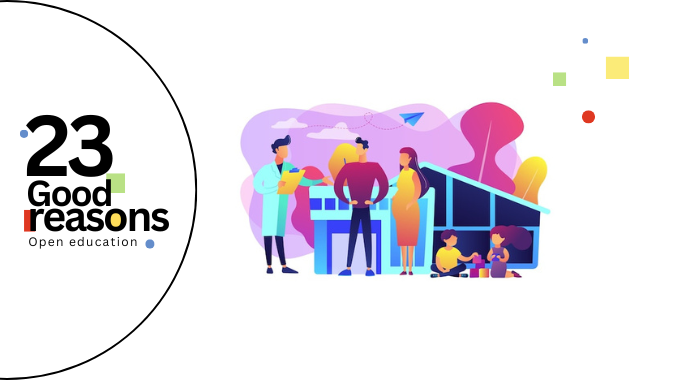
Open Education: A Reinvention of the Public Knowledge Service
Author
Pierre-Antoine Gourraud is a university professor and hospital practitioner in cell biology in Nantes. In 2018, he took charge of the “data clinic” at the Nantes University Hospital, a department dedicated to the secure and transparent use of patient health data. During the COVID crisis, he led makair, an open source artificial respirator project.
As a health teacher-researcher, open education brings a new dimension to the public knowledge service, the central pillar of our profession. This approach breaks down knowledge into three fundamental axes: transmission, development and application, each reinvented thanks to open education, an opening due to the use of digital technologies.
Transmitted Knowledge: Shared Knowledge in a Context
Open education makes information accessible to all. This sharing is not limited to simply making resources available: it is about making them reusable for other students by other teachers in a context that only these others know. Educational content is most meaningful when it is tailored to the needs of learners and enriched by human interaction. This contextualization is crucial because it transforms potential into an exchange. By opening up access to educational resources, we are redefining the boundaries of learning and implementing the first component of the public service of knowledge: transmission.
Developed Knowledge: Innovation in the Service of Openness
The second pillar of open education is the development of knowledge, often related to fundamental or applied research. In this field, digital tools and open data still play a central role. Our work on the systematic use of anonymous synthetic data perfectly illustrates this approach [https://www.nature.com/articles/s41746-023-00771-5]. Create value by sharing data information more and better. These artificially generated data make it possible to respect the privacy of the persons concerned but also the confidentiality due to the institutions and, in the case of health, that due to the caregivers, while opening up new perspectives for research. Data and digital tools open up new possibilities for solving complex problems. This new form of wealth sharing made possible by algorithms belongs to a “soli-data-rity” and is an ethical driver of research. Digital technology creates a tremendous opportunity for mutual aid and for lowering technical and social barriers.
Applied Knowledge: Transforming Knowledge into Know-How
The third component, applied knowledge, emphasizes the practice and transformation of knowledge into know-how. In this context, open education plays an essential role in making learners autonomous and competent actors. By making tools, methods and processes transparent and accessible, we offer them the means to apply knowledge in concrete contexts. This participatory approach places the learner at the heart of the action and makes application an essential pillar of open knowledge. Open education then takes the form of sharing “recipes” for series of instructions and in particular open source algorithms.
Open Education: A Political and Human Choice; Accepting to Lose Control
Beyond the technical and pedagogical dimensions, open education is above all a political choice, in the noble sense of the term. It is a choice for society, a wager on sharing, collaboration and transparency. By making knowledge accessible to all, we lose some control over how it will be used, adapted or transformed. But this loss of control is also an opportunity: that of seeing the emergence of unexpected solutions, ideas and collaborations, driven by diverse actors.
Digital tools enable large-scale collaborations, as shown by the example of the MakAir project during the COVID-19 crisis. This project, which aimed to quickly design an open-source ventilator, mobilized volunteers and partners from all over the world thanks to asynchronous and iterative coordination. This success demonstrates the potential of digital tools to unite energies around a common goal, while underlining the need for a detailed understanding of these tools in order to take full advantage of them.
Embracing openness means recognizing that technical challenges are often preceded by human challenges: cultural, organizational or social; they require collective intelligence. Opening up educational resources so that those who need them can benefit from them also means giving those who are able to seize the opportunity the chance to invent a new world.
Please note that this article has been translated with the help of artificial intelligence and reviewed by individuals who are not professional translators. Despite our efforts to ensure accuracy and fidelity, errors or inaccuracies may remain. Feel free to let us know at: chaireunescorelia@univ-nantes.fr
License
This article by Pierre-Antoine Gourraud is made available under the terms of the Creative Commons Attribution 4.0 International License.

Poster un Commentaire